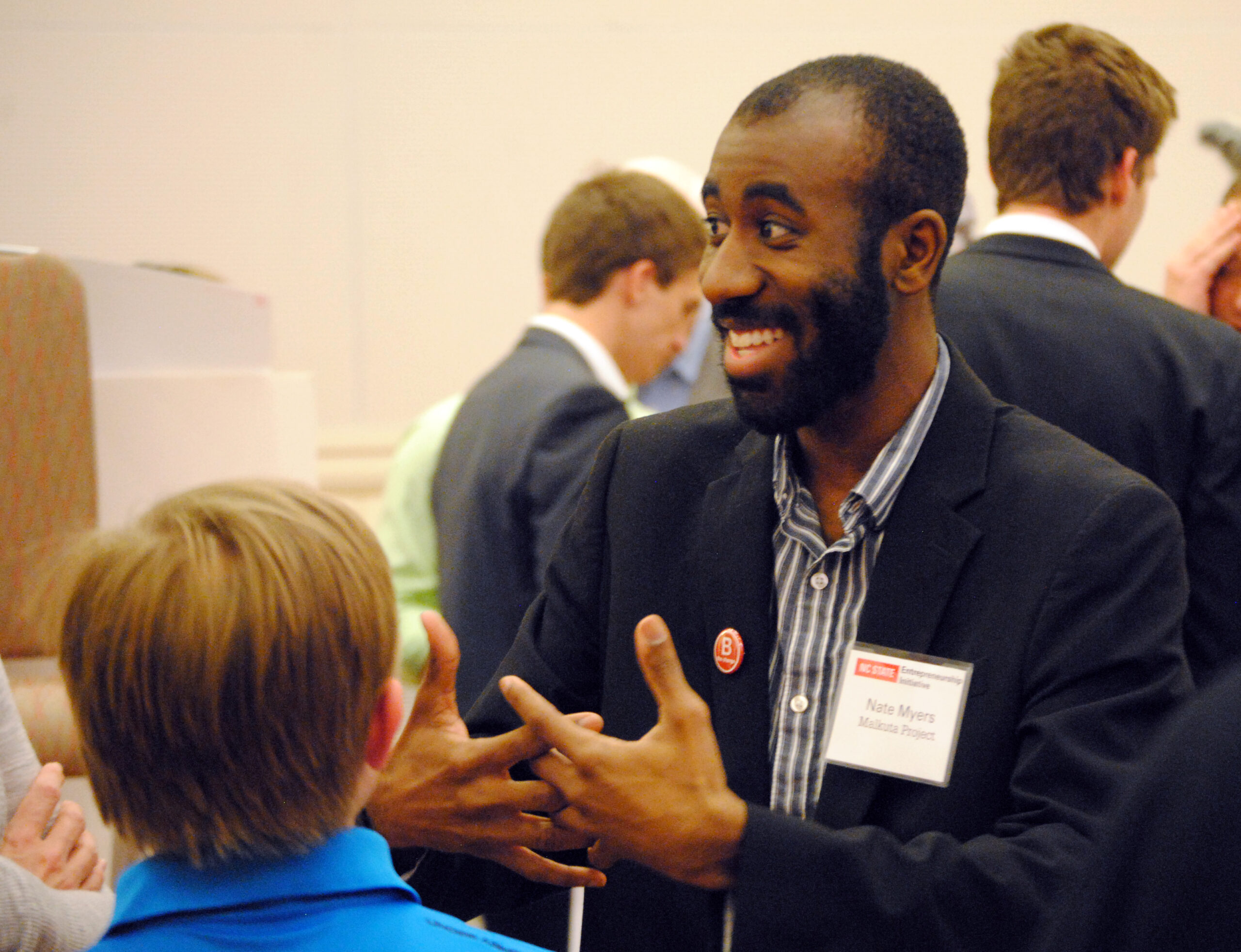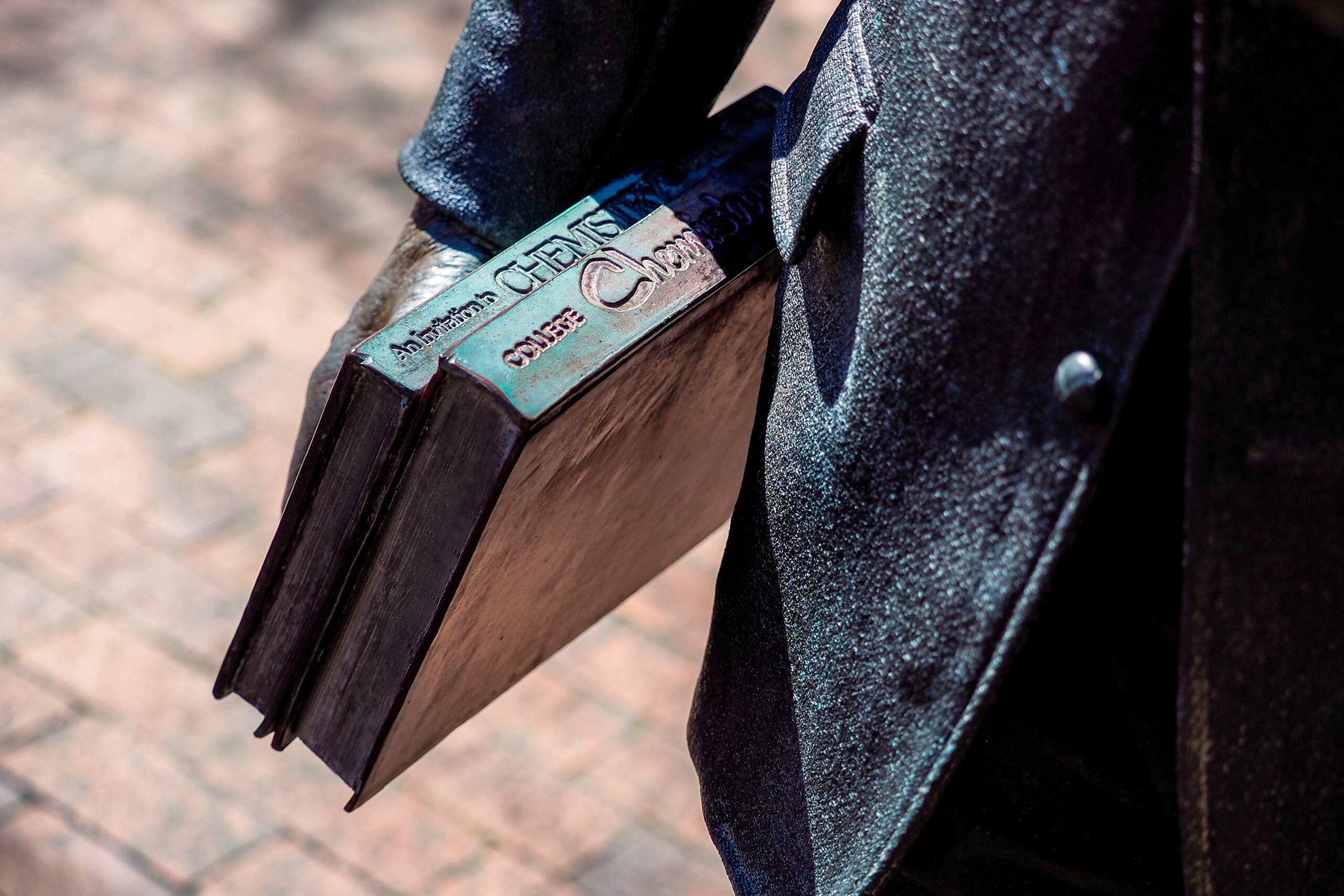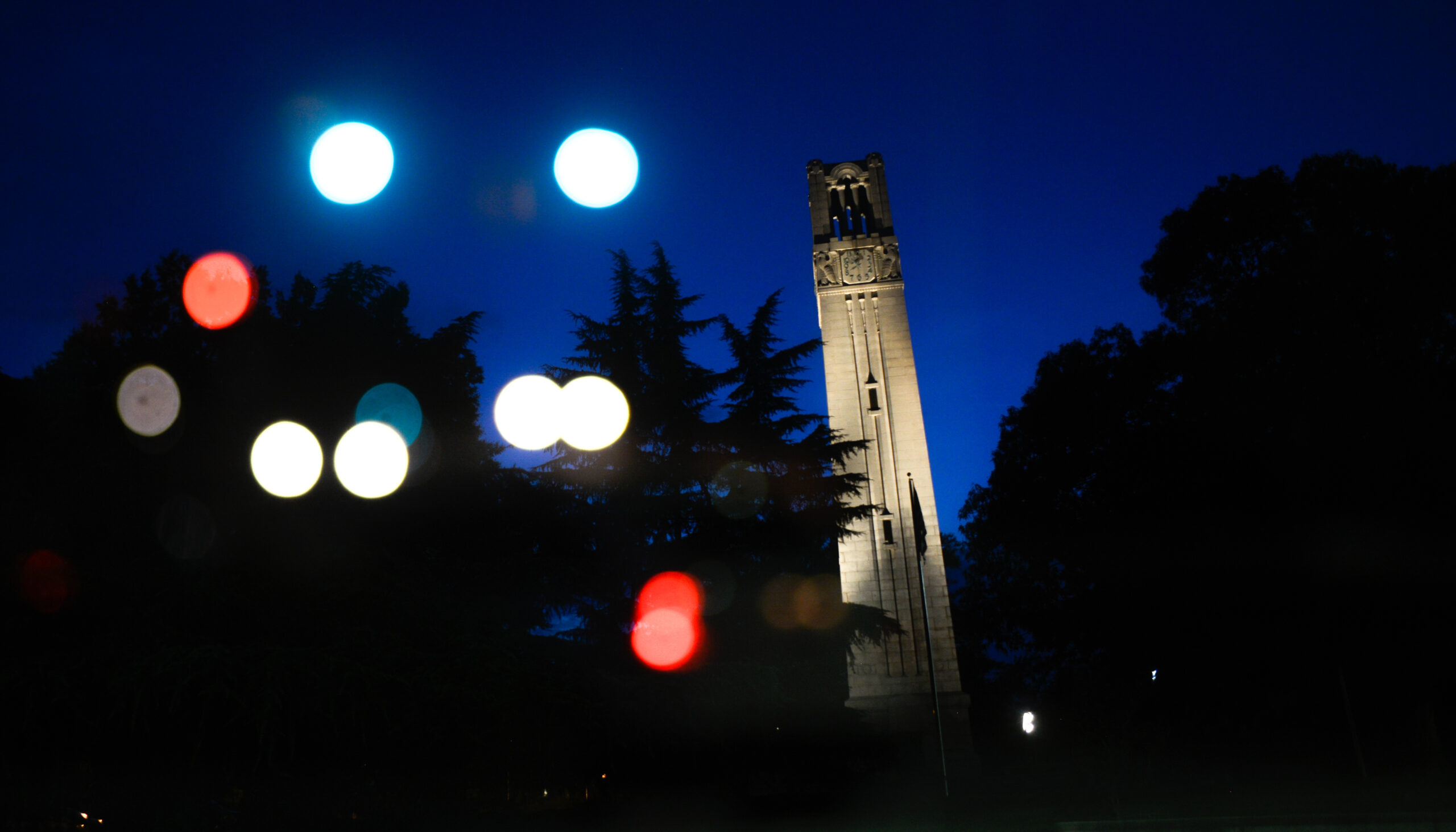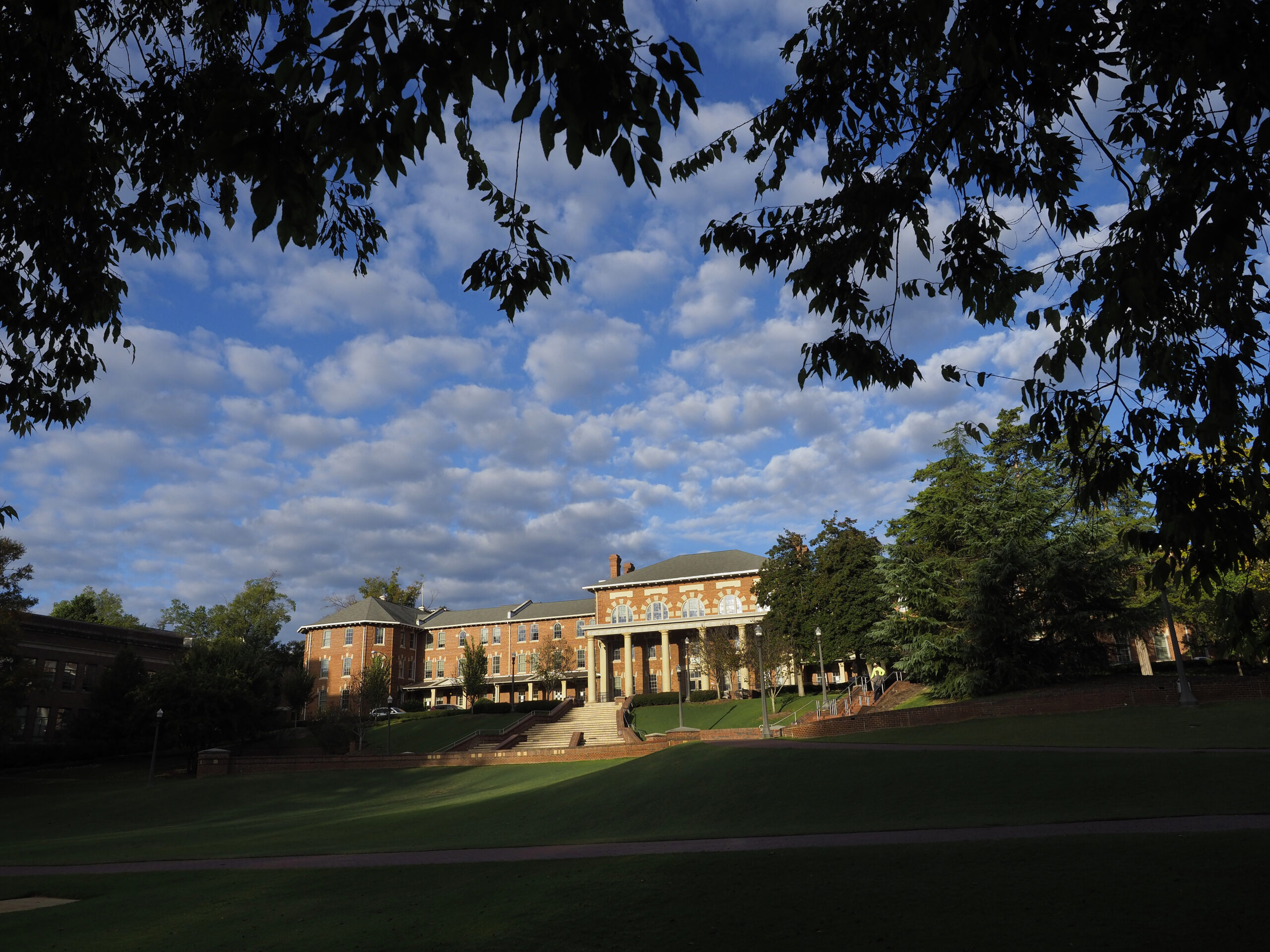Student’s Startup Helps Teens Tap into Creative Gifts

In the cozy Blackspace studio in the heart of downtown Durham, Nate Myers and his high school students prep to film their first interview of the weekend.
And it’s a big one — acclaimed jazz trumpeter and composer Terence Blanchard.
Circling two empty chairs at the center of the room, Myers helps his pupils adjust the lighting, then the cameras. He stops at one and gives 11th grader Zakiya Pettiway a quick refresher on adjusting the focus.
“You see how crisp and clear the shot is now?” Myers said, slowly turning the focus ring. “That’s what you want.”
For Myers, a senior science, technology and society major at NC State, the lesson is one of many he’s provided area youth in recent years.
Over the last four years, Myers has trained students in photography, videography and music production at the Boys and Girls Club of Wake County afterschool program. Working with teens largely from low-income households, Myers mentored students through multimedia projects with themes often promoting social change. Take a look at this video, for example:
Now, through his startup — the Malkuta Project — Myers is expanding the afterschool model to the broader community. Partnering with local businesses and organizations, he hopes to give students a chance to work on real multimedia projects for real clients. Think of it as a sort of workforce development program in the arts, he said.
One of his first partners is the Art of Cool jazz and hip-hop festival in Durham, which hired the Malkuta Project to film interviews with Blanchard and other artists during the multi-day event this spring. Myers’ startup is sponsoring four students to work on the festival interviews and other projects during an eight-week pilot program.
At the end of the program, Myers hopes to place each student in an internship with local business partners. And if the project is successful, he intends to duplicate the model during the school year.
The startup’s name stems from the Aramaic word, Malkuta, which translates to “kingdom” in English. The word carries a heavy weight with Myers, particularly in its Biblical usage in passages such as Luke 17:21 — “Behold, the Kingdom of God is within you.”
Student Nate Myers talks about his startup, the Malkuta Project, at the 2016 Lulu Egames at NC State’s Talley Student Union.
“It represents the idea of empowerment from within and that we all have a creative spark within us,” Myers said. “I took that philosophy and applied it in an artistic way with these teens, in the hope of getting them to tap into their gifts.”
While only in its early stages, the Malkuta Project has already achieved early success. At NC State’s 2016 Lulu eGames startup competition, Myers took first place in the Art Feasibility Study Challenge (a $4,000 prize) and placed third in the B Corp Champions Challenge. At the end of the night, Myers won the audience choice award during a pitch competition — picking up an additional $1,000 prize.
The money will come in handy during the startup’s launch this summer. So will an additional $4,100 he earned through a Kickstarter campaign.
Across the Earth and Back
Myers’ path to the present is filled with twists and turns. He initially enrolled at NC State in 2007 to study mechanical engineering. A Park Scholar and Caldwell Fellow, Myers excelled in the classroom and earned an internship with NASA’s atmospheric sciences division in 2008.
“NASA was nice,” Myers said, but his experience working on data analysis in a cubicle left him wanting something more.
He started to find that missing link during his sophomore year, when he said a trip to Ghana changed his life. It was his first time abroad, and he spent it studying at the University of Ghana and broadening his understanding of the culture.
It represents the idea of empowerment from within and that we all have a creative spark within us.
— Nate Myers on his startup, the Malkuta Project
He went abroad again during his junior year to Queensland, Australia. While taking a handful of engineering courses, Myers also took a business class where he focused on nonprofit projects. The course took him and his class into the Outback, where for five months they worked with an Aboriginal community on a water purification project. They partnered with a local company that provided solar stills, a low-cost and low-maintenance way to purify water. Myers helped install the technology while camping in the Outback for a week.
“I went to Australia to do research on scramjets (a supersonic combusting ramjet), but it turned into a water project for this Aboriginal community,” Myers said. “It was one of those life-changing events and really took me in a different direction. I knew something like this was what I’m meant to do.”
Flash Mobs, Shower Studios
When he returned from Australia, Myers’ perspective had changed. He realized engineering wasn’t working and decided to take a break from school.
However, before leaving, he took one more course over the summer: Nonprofit Leadership and Development with Mindy Sopher. As part of the class, students must spend 30 hours working with one of 18 partner agencies in the community. Myers chose the Boys and Girls Club, where he started volunteering as an after-school tutor.
After the course ended, Myers followed through with his break from school. He continued volunteering at the local agency, where his roles increased from that of an academic mentor, and he started getting to know the teens he met.
“It didn’t take long to realize there were kids there with some impressive artistic talents,” Myers said. “I played piano and had a keyboard, so we turned an old bathroom into a studio and started training students to record music.”

Myers, center, works with high school students Amere Richardson, left, and Kennedi Gerald, right, inside the recording studio at the Wake County Boys & Girls Club teen center in Raleigh in January 2016. Photo credit: Phillip MacDonald.
He began helping organize flash mob dances, skits and other performances throughout the area. And with the help of Sean King, a multimedia specialist at Duke University, the kids also started learning video and photography skills. It was the beginnings of the Malkuta Project.
“When I began to see some of the social challenges the students were facing — not feeling confident in the classroom, dysfunction at home, family members in jail — I became more aware of how these media projects were affecting them,” Myers said. “This was giving them an outlet to tell their stories.”
In January 2012, the Boys and Girls Club hired Myers part-time, a job he worked in conjunction with a teaching assistant position at Holly Ridge Middle School. When the Boys and Girls Club built their new facility in the summer of 2014, the group made sure to include funding for a studio space.
Support at NC State
Myers returned to NC State in Fall 2015 to fully explore his idea for the Malkuta Project. Yet while he was confident in his mission, he wasn’t sure which course of study was right for him.
Sopher, who stayed in touch with Myers throughout his time off, recommended an interdisciplinary program in the College of Humanities and Social Sciences: Science, Technology and Society. The STS program allows students to incorporate their own interests in technology with humanistic skills.
After talking to the program’s director Kathleen Vogel and learning his engineering credits would transfer, Myers said he was sold. He added an arts entrepreneurship minor as well.
Nate is a perfect example of someone who has taken full advantage of the opportunities we try to make available to students. It doesn’t matter what corner of campus they come from, if we can connect them to the ecosystem of entrepreneurship, all these opportunities are there — it’s shining a light and showing students the way.
— Elizabeth Benefield, Social Entrepreneurship Initiative program coordinator at the Institute for Nonprofits
“Because it blends, interprets and connects science and technology with people, I thought the STS program was perfect for Nate,” Sopher said. “Nate is a people-person — he’s got skills and interests in science and technology and is able to interpret that for people.”
Through STS, Myers got connected with the university’s social entrepreneurship initiative, the Audacity Factory, and Elizabeth Benefield, the program coordinator for NC State’s Social Entrepreneurship Initiative at the Institute for Nonprofits.
Benefield said they helped place Myers in an internship with Myriad Media, a video production company in Raleigh. She said Myriad aspires to promote and create social impact in its work, which she thought was a perfect fit for Myers.
“Both the company and Nate have completely benefited from each other’s’ energy,” Benefield said. “It’s been this beautiful match that the Institute was able to broker.”

The Institute for Nonprofits sponsored Myers, pictured here with NC State graduate assistant Jackie Parker, to attend the Ashoka U Exchange conference, where he had an opportunity to learn from top leaders in social innovation. Photo courtesy of Sandy Cyr.
The Institute also sponsored Myers to attend the Ashoka U Exchange conference, where he had an opportunity to learn from top leaders in social innovation. Benefield said the Institute also helped Myers make local connections such as Sean Kernick of Oak City Hustle, one of the companies the Malkuta Project is partnering with this summer.
“Nate is a perfect example of someone who has taken full advantage of the opportunities we try to make available to students,” Benefield said. “It doesn’t matter what corner of campus they come from, if we can connect them to the ecosystem of entrepreneurship, all these opportunities are there — it’s shining a light and showing students the way.”
Myers, who plans to graduate in December, said leaving school three years into a degree path was one of the toughest decisions he’s ever made. However, what he discovered at the Boys and Girls Club — what he discovered within himself — has made all the difference.
The Malkuta Project’s philosophy is just as much about his journey, he said. He knows from experience what it’s like to discover empowerment from within.
- Categories:


